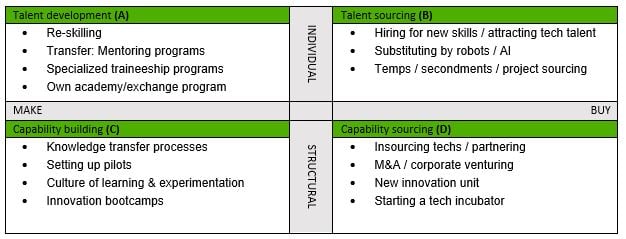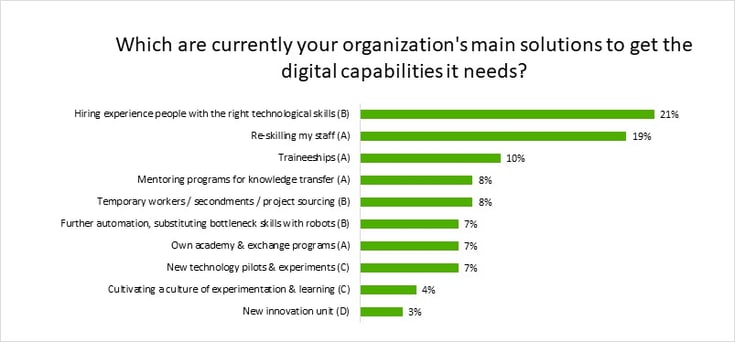As promising as technology may seem for the solution of labor problems, in reality it often merely ends up creating other problems. The actual challenge has to do with humans rather than technology. No matter how well orchestrated the technological transition, if your workforce – the people who will end up interacting with the technology on a daily basis – is not on board, nothing will be gained.
Successfully translating digital technology into ROI thus requires a workforce willing to and capable of working with the technology presented to them. A digital workforce with the proper skills, attitudes and mindset.
But what are the “right” skills? And how does your organization acquire them?
Introducing digital technology does not automatically solve labor problems. Competitive advantage can only be achieved by fostering a digital workforce willing to and capable of working with the technology.
General vs. specific digital skills
New technology is said to lead to higher skill demands for the labor force. The importance of generic skills in particular, is stressed. Social and communicative skills and basic knowledge of ICT/STEM combined with an attitude that enables flexible employability and quick learning, matter more than job- or task-oriented skills.

Dhondt, Bal & Kraan, 2019 (forthcoming)
Acquiring digital skills
Do you make or buy? Do you focus on the individual or the structural level? You could for example choose to foster a culture of learning experimentation (make) which allows for capacity building on a structural level. Or you could opt for the sourcing of new talent (buy) by hiring and attracting technical talent. More options are displayed in figure 1. A quick poll during Agoria’s Manufacturing Business Day showed that most organizations today are focusing on talent development and talent sourcing (figure 2). Hiring (buy) remains most popular. It seems to be the easiest way to quickly get the skills you need. Talent development comes in second. Both focus on the individual level.

We are altogether betting on the wrong horse.
Interestingly enough, the seven most highly ranked responses are the least efficient ones. According to theory, we are altogether betting on the wrong horse. First, buying talent is unlikely to lead to sustainable competitive advantage. Distinguishing yourself through resources which are readily available to all seems quite the paradox. Second, focusing on the individual level can turn out to be rather expensive and risky. If employees choose to leave your organization, your entire investment will be down the drain and you are back to square one. Combined with the findings of the TNO experiment which points toward strong effects of the organizational environment on individual skill levels, focusing on structural measures might be the smarter thing to do.

Key takeaways
-
In the digital age, generic skills matter more than specific skills.
-
Be aware of the environmental effect on general skill development. Invest in structural measures and redesign your organization to foster these specific skills.
-
It does matter how you acquire your digital skills. If you want your digital workforce to lead to competitive advantage, you are better off building skill and capacity yourself.



